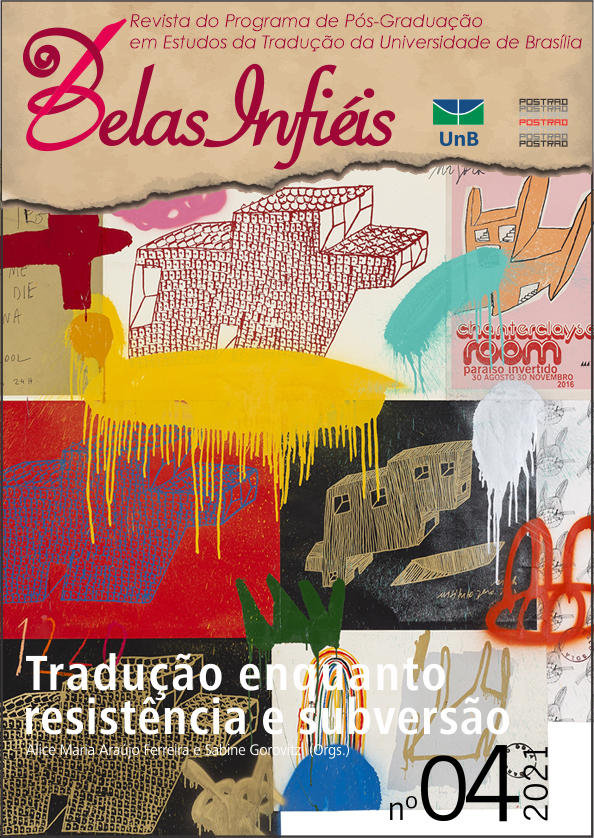For a Critical and Engaged Translator Training
DOI:
https://doi.org/10.26512/belasinfieis.v10.n4.2021.36372Keywords:
Translator Education. Sensitive Terrain. Narrative Approach. Political and Social Engagement. Undergraduate Dissertations in Translation.Abstract
Can or should translators engage politically and socially in their translations or academic research in translation? To what extent do translators and interpreters, including those in training, reflect upon the ideological nature of the knowledge they produce and its effects on the society? Starting from the problematisation of these issues, which says about the translator’s social and political place, we believe that a critical view of translation practice and political engagement - capable of resulting in emancipation and resistance actions - should be first exercised at the BA course. After all, cognitive, affective, social and political aspects are continuously interrelated in the subject in training. Thus, we propose an observatory of early-stage research in translation - carried out by undergraduate students at the end of their course - which is based on the idea of sensitive terrains, a concept borrowed from French anthropology, and on the narrative approach to translation (Mona Baker) and, for us, also to academic research. By updating the data collected by the observatory (covering the period from 2016 to 2019), we verified, in abstracts and introductions of undergraduate dissertations, how students position themselves concerning sensitive topics. This positioning can manifest itself in either their choices of a particular translated author or book or in the way they problematise issues related to translation practices and translations, which shows what we, as educators, have been fostering in Brazilian higher education institutions.
Downloads
References
Agier, M. (2006). Ce qui rend les terrains sensibles… et l’anthropologie inquiète. In F. Bouillon, M. Fresia & V. Tallio (Eds.), Terrains sensibles: expériences actuelles de l’anthropologie (pp. 175–184). EHESS.
Baker, M. (s/d). Narratives in and of Translation. https://www.academia.edu/218861/Narratives_in_and_of_Translation
Baker, M. (2018a). A tradução como um espaço alternativo para a ação política (C. Roscoe-Bessa, F. Lamberti & J. A. Rodrigues, Trads.). Cadernos de Tradução, 38(2), 339–380. https://periodicos.ufsc.br/index.php/traducao/article/view/2175-7968.2018v38n2p339/36483
Baker, M. (2018b). Reenquadrando o conflito na tradução (C. Roscoe-Bessa & F. Lamberti, Trads.). Cadernos de Tradução, 38(3), 518–548. https://periodicos.ufsc.br/index.php/traducao/article/view/2175-7968.2018v38n3p518
Baker, M., & Zaidan, J. M. (2019). Tradução e transformação social: uma entrevista com Mona Baker – Translation and social change: an interview with Mona Baker (J. Zaidan & P. Rezende, Trads.). PERcursos Linguísticos [Dossiê: Tradução & Transformação Social], 9(21), 14–35. https://periodicos.ufes.br/percursos/issue/view/1076
Berman, A. (1995). Pour une critique des traductions: John Donne. Gallimard.
Berman, A. (2013). A Tradução e a Letra ou O Albergue do Longínquo (M-H. C. Torre, M. Furlan & A. Guerini, Trads.). Copiart. (Obra original publicada em 1985)
Bhabha, H. (1994). The Location of Culture. Routledge.
Bouillon, F., Fresia, M., & Tallio, V. (2006). Terrains sensibles : expériences actuelles de l’anthropologie. EHESS.
Cheung, M. P. Y. (2013). Repensando o ativismo: o poder e a dinâmica da tradução na China durante o final do período Qing (1840–1911) (E. Gysel, Trad.). In R. F. Blume & P. Peterle (Orgs.), Tradução e relações de poder (pp. 309–346). Copiart.
Dias, C. F. (2018). O Posicionamento do protagonista David Lurie em Disgrace e Desonra pelo uso de diferentes línguas na narrativa [Trabalho de Conclusão de Curso, Universidade Federal do Rio Grande do Sul]. https://lume.ufrgs.br/bitstream/handle/10183/193079/001090714.pdf?sequence=1&isAllowed=y
Fish, S. (1980). Is There a Text in This Class? The Authority of Interpretative Communities. Harvard University Press.
Ghasarian, C. (2002). De L’ethnographie à l’anthropologie réflexive nouveaux terrains, nouvelles pratiques, nouveaux enjeux. Armand Colin.
Gonzalez, B. O. (2019). A interpretação sócio-comunitária e a imigração estudantil hispanófona no contexto de formação do bacharelado em letras – tradução espanhol/português da UFPel [Trabalho de Conclusão de Curso, Universidade Federal de Pelotas].
Grossmann, F. (2015). Por que as coisas mudam? Padronização e variação no campo do discurso científico (H. Mari, Trad.). In F. Rink, F. Boch & J. A. Assis (Orgs.), Letramento e formação universitária (pp. 97–128). Mercado de Letras.
Lacerda, M. (2019). Bendito seja o fruto: uma legendagem sob a ótica feminista e funcionalista de The handmaid’s tale [Trabalho de Conclusão de Curso, Universidade de Brasília]. https://bdm.unb.br/handle/10483/24542
Loguercio, S. D., & Silva, M. M. (2020). Estudo exploratório: que temas são traduzidos e/ou pesquisados em cursos de tradução no Brasil? Cultura e tradução, 6(1), 69–84.
Monteiro, L. M. F. P. (2016). Identidade e Alteridade Tradução e manifestação da poesia de W. B. Yeats [Trabalho de Conclusão de Curso, Universidade de Brasília]. https://bdm.unb.br/handle/10483/16418
Nord, C. (2016). Lealdade em vez de fidelidade: proposta de uma tipologia funcional da tradução (C. K. Kilian, Trad.). Cadernos de Tradução UFRGS, (N. especial), 9–34.
Santos, B. de S. (2011). A crítica da razão indolente: contra o desperdício da experiência (v. 1, 8ª. ed.). Cortez.
Silva, M. M. (2019). Ética e mediação tradutória. In ENCONTRA: 2º. Encontro de Tradução, Universidade Federal do Rio Grande. https://www.youtube.com/watch?v=tOscVi-FcnU&t=126s
Simon, S. (1996). Gender in Translation. Routledge.
Spivak, G. C. (1993). The Politics of Translation. In L. Venuti (Ed.), The Translation Studies Reader (pp. 397–416). Routledge.
Tymoczko, M. (2013). Ideologia e a posição do tradutor: em que sentido o tradutor se situa no “entre” (lugar)? (A. C. Teles, Trad.). In R. F. Blume & P. Peterle (Orgs.), Tradução e relações de poder (pp. 115–148). Copiart.
Venuti, L. (1995). The Translator’s Invisibility – A History of Translation. Routledge.
Venuti, L. (2002). Escândalos da tradução: por uma ética da diferença (V. Biondo, M. D. Esqueda, L. Pelegrin & L. M. Villela, Trad.). EDUSC. (Obra original publicada em 1998)
Downloads
Published
How to Cite
Issue
Section
License
Copyright (c) 2021 CC BY

This work is licensed under a Creative Commons Attribution 4.0 International License.
Given the public access to this journal, the texts are free to use but requires the recognition of the original authorship and initial publication in this journal to be properly stated.
 The journal allows the use of works published for non-commercial purposes, including the right to submit the work to publicly accessible databases. Published contributions are the sole and exclusive responsibility of the author(s).Â



















